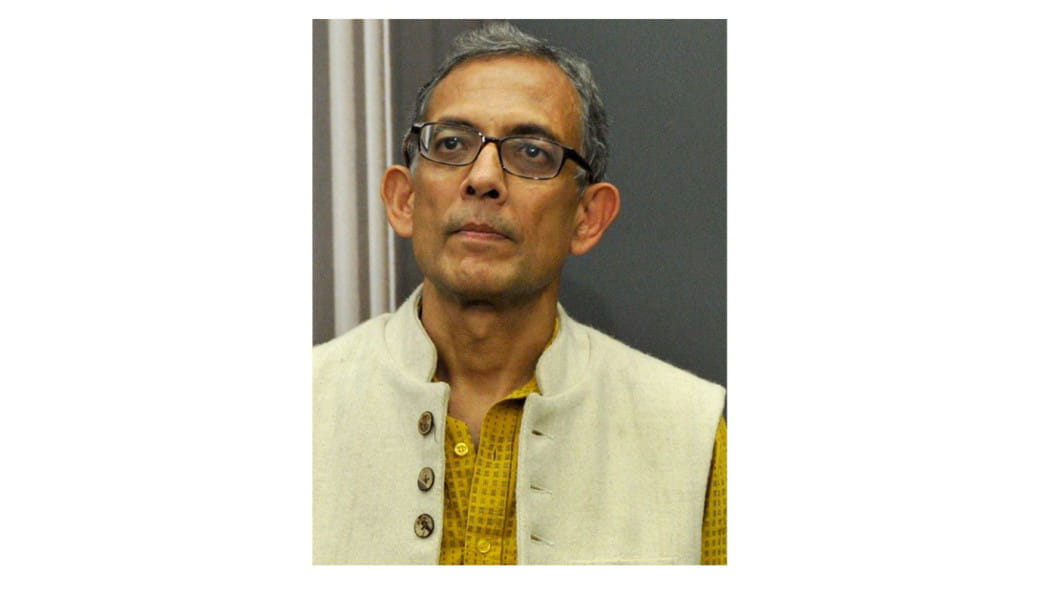Evidence-based policy key to sustainable growth

Evidence-based policymaking and timely impact evaluations are essential to ensure development efforts lead to real progress, Nobel laureate economist Abhijit Banerjee said today.
"Evidence is not costly. Relative to the scale of many government programmes, it's actually quite cheap," said the economist in a virtual lecture delivered during a seminar titled "Transforming Development: Building a Culture of Accountability through Evaluation, Auditing, and Ethics" at InterContinental Dhaka.
The event was jointly organised by the Economic Relations Division (ERD) of the Ministry of Finance and the New Development Bank (NDB). Global policymakers, development specialists, and private sector leaders joined the programme.
Banerjee, a professor at the Massachusetts Institute of Technology, said that a greater challenge than cost was the sluggish pace of gathering evidence. "We need to be nimbler," he said.
Responding to a question on persistent poverty despite strong GDP growth, Banerjee said it depends on whether the rise in GDP per capita reaches the poor.
Over the past 30 to 40 years, the economist said, gains from GDP growth have disproportionately benefited the wealthy in many countries.
"I think there is too much talk about GDP… we should talk about GDP per capita."
According to the economist, income distribution must be central to any discussion on sustainability.
"The word 'inclusive' is often used to imply support for the poorest, but in fact, it is about more than that," he said. "This does not mean excluding the non-poor from policy considerations but rather focusing on the most effective use of resources."
He pointed to climate change as a pressing concern for Bangladesh, especially in regions near the Sundarbans where traditional ways of life are under threat.
"It should be possible to identify populations whose lifestyles are becoming increasingly unsustainable," he said, adding that growing inequality within and between countries is challenging the notion of economic sustainability.
"We talk a lot about inclusive growth, but I think we forget that inclusive growth is not just about letting markets run their course and then dealing with poverty afterwards," he said. "We have been relatively good at that."
While global efforts have reduced poverty, Banerjee believes a broader crisis has emerged.
"We ignored the fact that large groups, such as the lower middle class and those at its fringes, felt excluded. Many of them are not the poorest, but they deeply resent the changes brought about by policy decisions."
He said, "If you want to be inclusive, you have to do redistribution well. That means being generous but also ensuring you can recover and reallocate funds effectively."
Banerjee urged a shift towards data-driven decisions. "Let's use the evidence, generate it, be mindful of it. And perhaps then we can control and mitigate the crisis the world is facing."
At the programme, Finance Adviser Salehuddin Ahmed also called for development projects to undergo proper appraisals, follow due processes, and be held to strict standards of transparency and accountability.
"Government spends recklessly, and much of it goes to waste," said Salehuddin, a former governor of the Bangladesh Bank. "So, we don't get the real benefits."
"Auditing is essential, but it must be genuine. Local communities are the best judges of a project's impact, so social audits can be a powerful tool."
Technical audits, he added, are also important. "Evidence-based decision-making is always welcome."
Md Shahriar Kader Siddiky, ERD secretary at the Ministry of Finance, said the government is keen to adopt best practices in evaluation and ethical governance to ensure the success of development initiatives.
"We want to introduce monitoring tools from the very beginning of project implementation to mobilise resources effectively," Siddiky said.
Iqbal Abdullah Harun, secretary of the Planning Division, said that although evaluation is often overlooked, it is vital to achieving meaningful results from projects.
Md Kamal Uddin, secretary of the Implementation Monitoring and Evaluation Division (IMED), added that independent evaluation is important in promoting sustainable development, and the government is working to strengthen accountability in implementation.
Mirana Mahrukh, additional secretary of the ERD, also spoke at the programme.
Ashwani K Muthoo, director general of the Independent Evaluation Office at the NDB, gave the opening remarks.

 For all latest news, follow The Daily Star's Google News channel.
For all latest news, follow The Daily Star's Google News channel. 



Comments